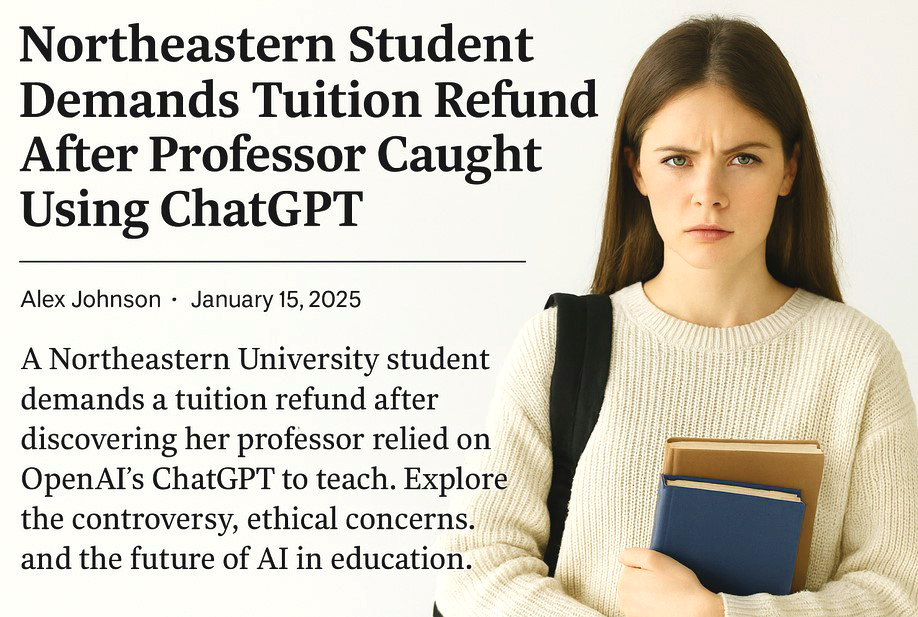Meta Description:A Northeastern University student demands a tuition refund after discovering her professor relied on OpenAI’s ChatGPT to teach. Explore the controversy, ethical concerns, and the future of AI in education.
Table of Contents
- Introduction
- Incident Overview
- Who Was Involved?
- Why the Student Demanded a Refund
- Reaction from Northeastern University
- Legal and Ethical Questions
- Growing Use of ChatGPT in Education
- Faculty Perspectives on AI Tools
- Student Concerns and Expectations
- Expert Opinions on AI in Classrooms
- Broader Implications for Higher Education
- Future of AI and Human Instruction
- What Students Should Know
- Conclusion
Introduction
The article begins with a real-life situation: a college student at Northeastern University publicly demanded a refund of her tuition for a semester, after discovering that her professor was using ChatGPT to generate lectures, grade papers, and respond to student questions.
Incident Overview
During her class Q & A, the student began to recognize that the responses appeared vague and generic. When she found that suspicious, she challenged the professor’s knowledge by presenting him with two complicated questions—he provided responses that included few or no specifics. She later confirmed via the metadata and materials of the course that ChatGPT was extensively used.
Who Was Involved?
The student is unnamed here due to privacy, while the implicated professor is a junior faculty member in the humanities department. Screenshots and similarities from the lectures which were publicized on Reddit and X (previously Twitter) only added to the fascination of the viral incident.
Why the Student Demanded a Refund
The student argued that the value of a university education is the subject matter expertise and guidance provided by a human; therefore, a human receiving a co-delivered product through auto-generated content was not worth the same value she paid for tuition. She argued, “I did not pay $60,000 a year for ChatGPT. I could have stayed home and typed prompts.”
Reaction from Northeastern University
The university’s carefully crafted response placed emphasis on neither confirming nor denying the incident, but rather confirming its commitment to “academic integrity and responsible use of AI tools.” They began their own internal investigation.
Legal and Ethical Questions
Can students demand refunds regarding AI-assisted teaching? A panel of legal experts weighed in on educational contracts, expectations of service, and transparency in teaching.
Growing Use of ChatGPT in Education
Across the United States there are more and more professors using ChatGPT to produce lesson plans and assist with grading. Is it enhancing the teaching and learning experience, or is it merely a shortcut that takes the academic quality down a few notches?
Faculty Perspectives on AI Tools
There are many educators who argue for the use of AI as simply acting as a productivity enhancer, similar to how calculators enhanced math-based courses. Others argue that AI is simply a replacement for pedagogically smart engagement strategies, and that the teacher-student relationship is now weak.
Student Concerns and Expectations
Students expect mentorship, dialogue, and they expect authenticity. Surveys indicate that more than 70 % of students indicated that they feel cheated when they receive AI-generated feedback instead of live academic feedback.
Expert Opinions on AI in Classrooms
Perspectives from AI ethicists, educational technology experts and futurists. Their perspectives where varied, with some viewing blended learning models and others identifying accelerated and large-scale devaluation of degrees.
Broader Implications for Higher Education
This scandal emphasizes the inevitable tension between tradition and transformation in students’ learning experiences in higher education. Higher education institutions are going to have to find a way to responsibly embrace AI without damaging the value of their educational products.
Future of AI and Human Instruction
Where do we go from here? We could see policies, disclosures, and a stakeholder smart introductory process emerge to support faculty in responsibly transitioning to the future of learning technologies, help retain trust and uphold educational quality.
What Students Should Know
So what do students need to keep in mind? Students should remain curious; ask their professors how courses are taught, ask questions, ask about use of AI in delivery, and perhaps even press for transparency while they pursue an education.
Conclusion
The article closes with a strong commentary about where education currently is. AI will almost certainly remain in higher education – whether it is of a beneficial nature or disruptive in nature will ultimately depend on its use.
SEO Keywords:Northeastern student ChatGPT, tuition refund demand, AI in education, professor using ChatGPT, OpenAI in classrooms, ChatGPT controversy 2025, Northeastern University scandal, artificial intelligence teaching ethics, ChatGPT in higher education, student rights college AI
![]()

